Giant List of Facebook Groups for Entrepreneurs and Startups

Facebook may be losing some popularity in the opinions of many people around the world, but it's still the most-used social network globally, and as such, it's packed full of small communities centered around pretty much every conceivable interest.
It should come as no surprise that there are, perhaps, tens of thousands of groups dedicated to entrepreneurship, startups, small business, and other related niches. There are simply so many of them that it becomes nearly impossible to determine which ones are worthwhile. You can make a few judgments, however.
Rather than just dump a giant list of Facebook groups, I've sorted these into groups and gave each one a short description so you know how many members it has, whether it is private or public, how active it is, if the group has any membership restrictions, and so on.
The value of each group is more important than the list itself, which is why so many of the lists I've found aren't very good and are filled with inactive groups.
Let's get started!
 30 Second Summary
30 Second Summary
You'll find the most value in private Facebook groups with 1,000-50000 members and 250-500 daily posts. You should look for groups that have active moderation, clear joining requirements and good engagement (50-100 likes per post). When searching, you'll want to avoid public groups since they often attract spam and low-quality content. You can check if your trusted friends are members of a group to help judge its quality. For the best experience, join groups that match your language and have consistently active discussions.
Determining the Value of a Facebook Group
If you go to Facebook and type "entrepreneur" into the search bar, and then click the Groups filter, you'll be presented with a list of all of the Facebook groups that meet your search criteria.
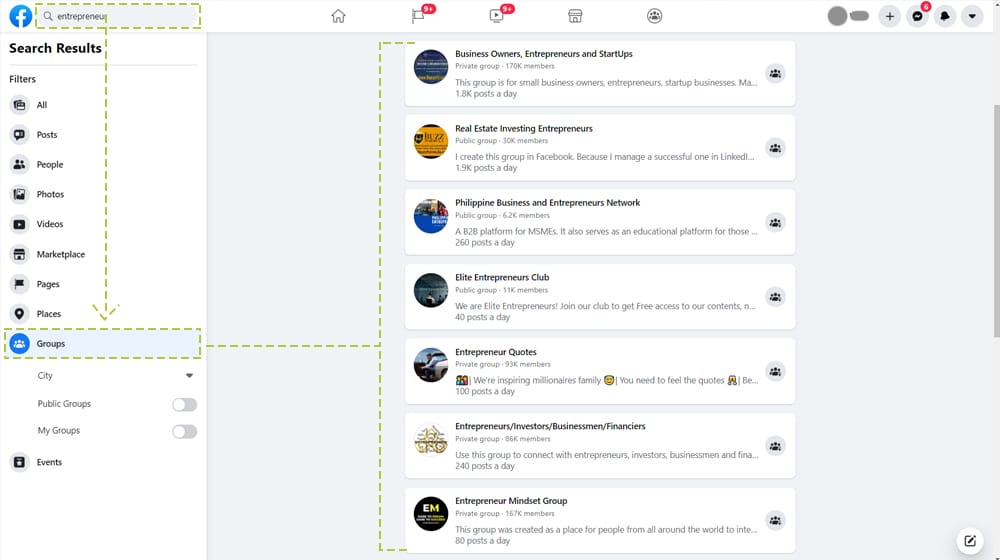
There are a couple of additional filters that you may or may not have in effect as well.
- You can choose a city for the groups to be centered around. This might be relevant to you if you're looking to start a business in a given city, but for the most part, entrepreneurship and startup business ideas, tips, and information are the same no matter where you are.
- There's a toggle to show public groups or only private groups. There's a very real difference between the two, and there's a good reason Facebook defaults to only showing private groups.
- Your groups. If you're already in groups, Facebook won't show them by default. If you're looking for new groups to join, you can keep this filter in place.
So, when you're considering joining groups, what should you look for as indicators of quality?
1. Public vs private. Public groups are free to access, free to view, and free to spam. Anyone can join them, which means there's a non-existent barrier to entry for scammers, spammers, and others who don't want to contribute. This leads, as you might expect, to poor quality communities.
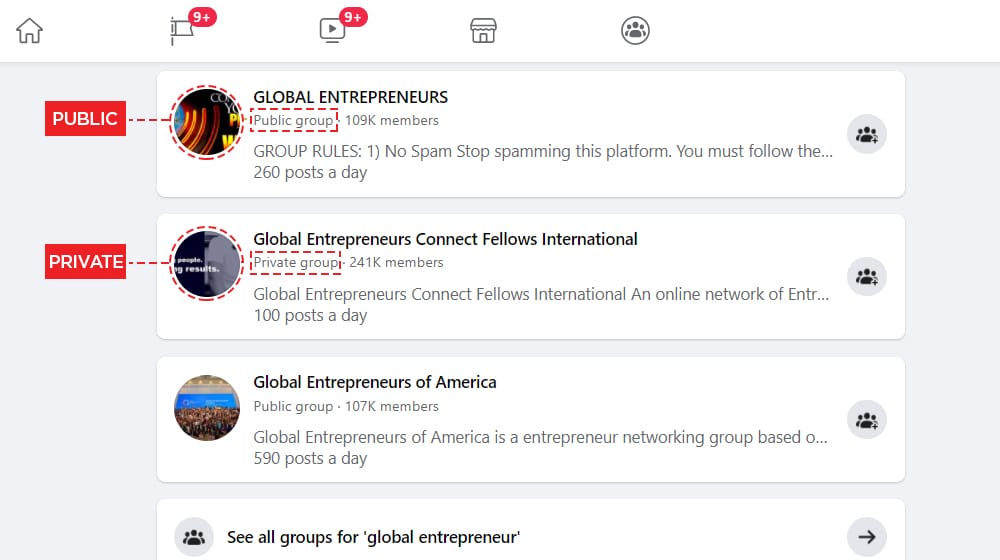
Take, for example, the group Young Entrepreneurs – Business Ideas. It's a public group, freely visible to anyone with a Facebook account to join, and it has 61,000 members. Then you look at the most recent posts, and you see things like:
- A Facebook messenger spam bot for sale.
- People selling affiliate content and other chain letter-style spam.
- Someone just selling a phone.
- Someone advertising a "job" as a captcha breaker.
It's also a group based in the Philippines, which lends itself to certain kinds of posts, many of which are not useful for many entrepreneurs.
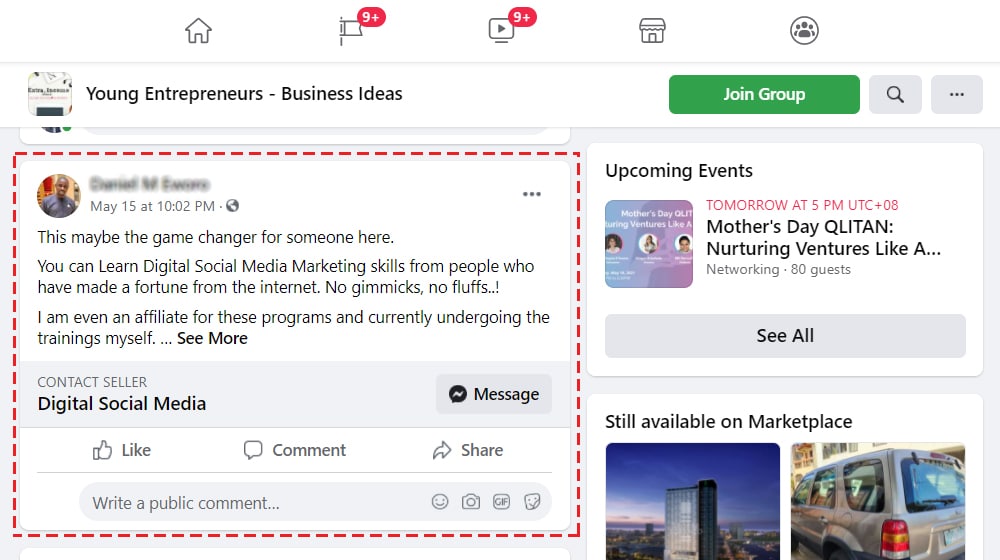
Compare that to a private group, where admission requires answering specific questions, the moderation team boots people who post spam or unrelated content, and the community is both driven and focused.
In the vast majority of cases, private groups are the better way to go. I'm not going to discount the possibility that some public groups are good, but it will take much more effort to sort through them to find the diamonds in the rough, and it's simply not worth it in my opinion.
2. Number of members. Groups with extremely large numbers of members should be avoided. I hate to say it, but these groups have a lot of issues and are commonly spammed.
The way Facebook's algorithms work, very few of the posts made in a group will ever come across your feed. You would have to browse the group directly, and when you do, you'll see many other people falling victim to the same thing. You'll see tons of duplicate posts, people asking the same basic questions over and over, and a ton of cross-talk.
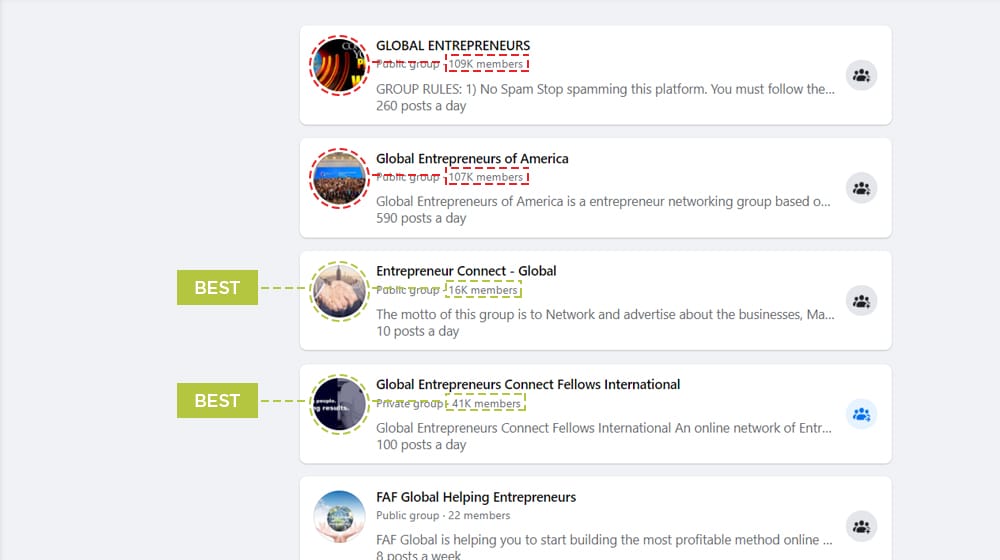
I find that there's a sweet spot. Groups with over 100k members are often busy and are flooded with posts. I've found that niche groups between 1,000 and 50,000 members are generally the best. This isn't to say that larger groups can't be worth joining, just that the signal-to-noise ratio is often poor.
At the same time, very small groups– groups with under 100 users – are often not very good. The exception to this is if they're tightly focused on a very small niche, like a small geographic area. In that case, you're likely to get more valuable information from them… if they're active. It's very easy for a small community to fail when people simply stop posting in it, especially since Facebook's algorithm is very likely to stop sharing those posts when group activity drops.
3. Number of posts per day. A good indication of the size and activity of a group is the number of posts per day metric that Facebook shares. Good groups are active. If a group has thousands of members, but under 10 posts per day, it's not likely to be a very good group.
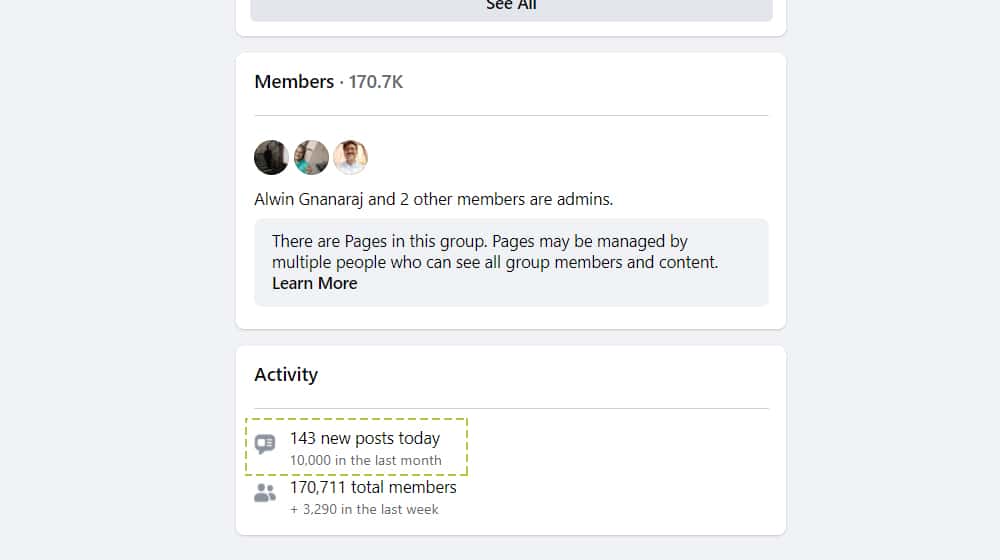
Conversely, groups with thousands of posts per day can become very difficult to sort through. Again, there's a sweet spot.
This is more personal than the number of members, and a lot of it depends on how much time you're willing to spend engaging in a group. You should probably avoid groups that aren't publishing at least a handful of new updates every day or that have very little engagement.
4. Restrictions on joining. Different groups have different restrictions on joining them. Some private groups might simply as questions like "are you an entrepreneur?" and "do you want to join a community of highly motivated business owners?". These exist primarily to keep bots and low-quality spam accounts from joining.
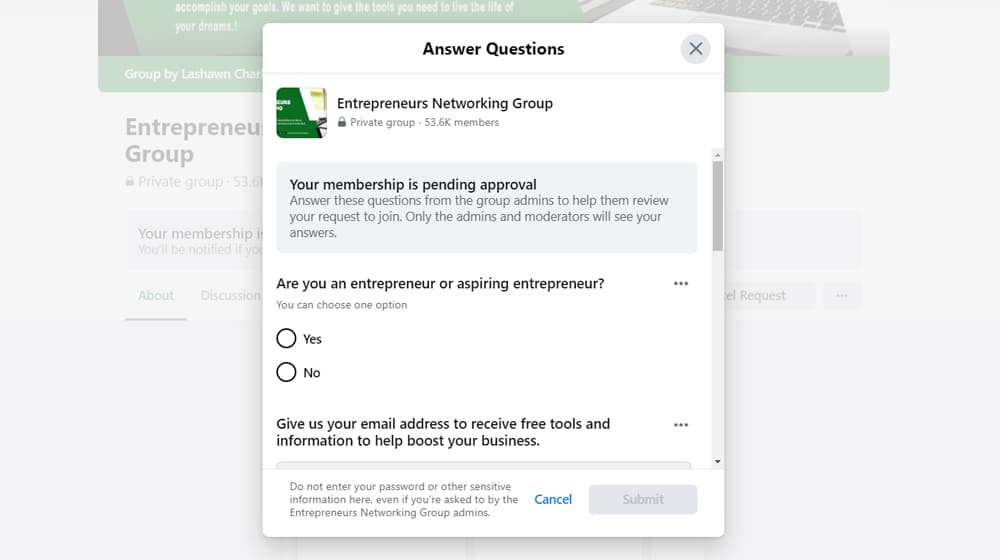
Other groups might have more rigid restrictions. For example, a group dedicated to women entrepreneurs might not let you in if you're not a woman. A group centered around a geographic area might want you to confirm that you live in that area before letting you join. Since requirements to join are set by the admins, they vary wildly. The stronger the restrictions, the more exclusive and, often, the higher quality the group will be.
5. Active administration. Often, a group is only as good as the people who run it. Active administration is required to gain access to private groups. Active moderation is required to keep a group pleasant and useful to join. Unfortunately, there's no way to tell how active the ownership is until you join, or try to join and never get approved.
6. People you know already in the group. If you're friends with other entrepreneurs on Facebook, and you've networked with people you trust in the space, you can see when your friends are in a group.
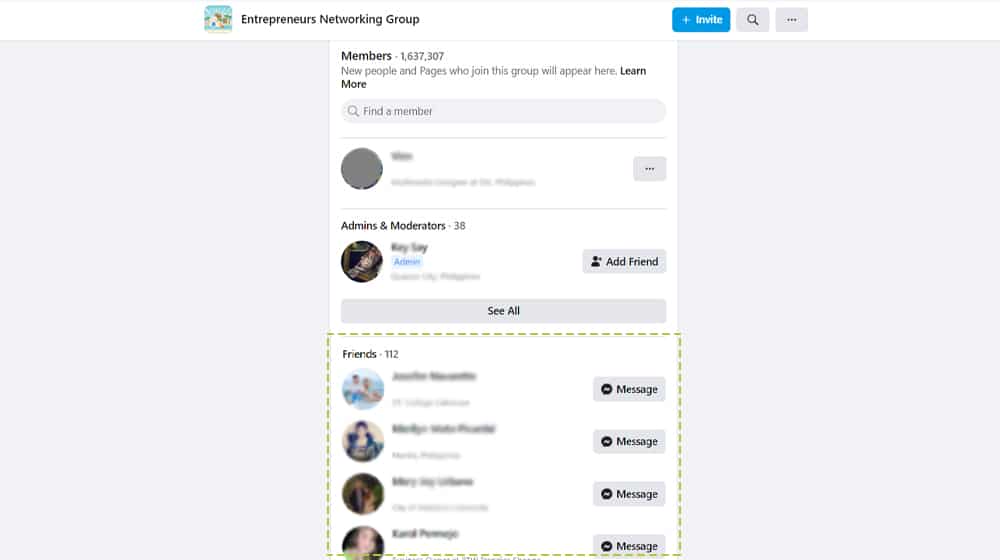
That can be a sign that a group is worth joining. It depends on how much you trust your friends to have good taste. You can, however, just ask your friends if the group is worth it.
7. Language. The language barrier is real on Facebook. There are plenty of groups you can join that are primarily in a language you can't read. It's better not to bother with these. There are more than enough groups to go around.
8. Engagement. I saved this one for last because it's something that you're not able to see in private groups until you're allowed in the group. A popular group will have anywhere between 50 and 100 likes per post, which is a lot, considering these groups can sometimes have 500-1000 new posts per day. Low engagement posts may only have a small handful of likes on each post - these groups are less likely to reach a wide audience and can likely be skipped.
The Grand List of Facebook Groups
With this list, my goal is to go for quantity over quality. I've listed as many active groups as I can below, but I have not joined them all (in fact, I can't join many of them, for reasons such as "I'm not a woman") so I can't tell you what the overall quality of these groups looks like.

General Groups
- Business Owners, Entrepreneurs, and StartUps – Private, 169k members, a Facebook group for the website boescify.com, which seems to be a general business advertising network.
- Entrepreneurs and Start-Ups – Private, 129k members, a group centered around the website tekpon.com. It's pretty aggressive with moderation and has an active team.
- Entrepreneurs Networking Group – Private, 52k members, designed for entrepreneurs to inspire and help one another, as a network for business partnerships, and as a place for business owners to share stories.
- Millionaire Mindset | Entrepreneurs Club – Private, 249k members, aimed at people who want to become millionaires through business. A bit aggressive, and it allowed sponsored posts if you pay the admin, but some of it is good.
- Entrepreneur Quotes – Private, 93k members. A pretty basic group sharing quotes and inspirational posts, just as a way to occasionally give you motivation through your feed.
- Entrepreneur Mindset Group – Private, 167k members. Created as a large and collaborative community. The downside to this group is that it claims to be a "global" group but it deletes any post that wasn't written in English.
- Entrepreneurs/Investors/Businessmen/Financiers – Private, 86k members. A business group for entrepreneurs and the people who finance them.
- American Entrepreneurs (Business Networking in the United States) – Public, 409k members. This group was riddled with spam for a long time, but new admins claim to be cleaning it up. It remains to be seen how effective they'll be.
- Entrepreneurs Helping Other Entrepreneurs – Private, 7k members. A small group run by Leanne Hollinshead Marketing Agency.
- The Disruptive Entrepreneurs Community – Private, 21k members. Focusing on a community built around a podcast of the same name.
- DFW Entrepreneur Group – Private, 15k members. Based in the greater DFW area, though stretching out to Atlanta as well. An example of what more regional groups look like.
- 7-Figure Mindset Secrets for Entrepreneurs – Private, 5k members. A "tight-knit" and exclusive group that is surprisingly picky about who they let in.
- Spocket | Oberlo | Printful – Shopify & Wix Dropshipping for entrepreneurs – Private, 68k members. A very focused group setting up dropshipping using a specific set of tools.
- Investors-Startups for Business – Private, 79k members. A startup-focused group that aims to help streamline the management process.
- Startups, Small Business, Self Employed, Entrepreneurs, Investors, Fintech – Private, 62k members. This group is focused on the UK and, specifically, London, though the name doesn't reflect as much.
- Silicon Valley Startups – Private, 22k members. A group dedicated to specifically silicon valley, with all that entails.
Groups for Minority Groups
- Successful Female Entrepreneurs – Private, 83k members, fairly active. The group is managed by Maria Wendt and is focused on female entrepreneurs specifically. It has a large and active moderation team.
- Black Entrepreneurs – Public, 22k members, one of the most well-moderated and spam-free public groups I've ever seen. As you can gather, this group is dedicated solely to black entrepreneurs (not just American, either!)
- The Female Entrepreneur Community – Private, 25k members, focused on female entrepreneurs. It's a safe and collaborative space that I've heard many good things about.
- Women Helping Women Entrepreneurs – Private, 473k members. One of the largest female-focused entrepreneur groups on Facebook.
- Women's Entrepreneur Network – Private, 73k members. A networking and business support group for women. They have a website as well, which you can find at womensentrepreneurnetwork.org.
- Women Entrepreneur and Founders Helping Each Other – Private, 13k members. A smaller version of some of the larger options already listed above.
- Ambitious Women Entrepreneurs and Coaches – Private, 6k members. As you can see, female entrepreneur groups are among the most popular niche groups out there.
- Amazing Women Entrepreneurs Network – Private, 58k members. A group centered around the website of the same name.
Other Lists
- 12 Public Facebook Groups You Should Join for Great Business Insights – An article by SmallBizTrends listing some of the more usable public Facebook groups.
- Top 10 Facebook Groups Every Entrepreneur Should Join For Inspiration – Business2Community's curated list of Facebook groups for entrepreneurs.
- 19 Facebook Groups That Will Make You a Better Entrepreneur – A list of Facebook groups for entrepreneurs, curated by the folks at Gusto.
- Jumpstart Your Business: 32 Great Facebook Groups to Follow – Referral Candy is one of the better tools I've seen for certain kinds of entrepreneurship, so a list they curate is going to be decent.
- Best Facebook Groups for Entrepreneurs in 2021 – Another list of Facebook groups, about 23 of them if I counted right.
There are, as I said up above, easily tens of thousands of groups out there. This doesn't even mention the hidden groups that you can only gain access to if you join through particular communities. It's a good place to start, but by no means should you try to join them all, unless you want an unusable Facebook feed.
Pick and choose the best, and if I missed any, or if you'd like your group added to this list, let me know in the comments section below! I'm continuously updating and adding to this list and would love to have your recommendation.



 30 Second Summary
30 Second Summary

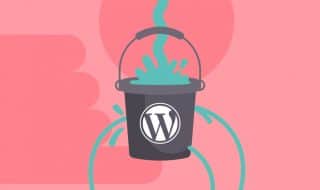

July 15, 2021
I have been asked by my mentor to join groups that will help my new business known. This is a great help.
July 15, 2021
Thanks Coral! Please let us know which your favorite was, or which was most effective 🙂
January 11, 2022
I appreciate this very much! It's very annoying to find a seemingly decent group only to find out it's filled with spammy content, so this is a big help.
January 12, 2022
Hey Jeremy! You're very welcome! Good luck, let me know how it goes.
February 07, 2022
Nice to see I'm already a member of some of these groups. Equally nice to have new groups to join from here.
February 10, 2022
Thanks, Barry! It sounds like you're already ahead of the curve.
May 25, 2022
I've been a member of Entrepreneurs and Start-Ups since 2020 and I can completely vouch for it. The mod team does a great job of keeping it free from spam.
May 26, 2022
Hey Fran, thanks for letting everyone know!
June 05, 2023
Very informative. You did a great job. Are you located in Houston?
June 11, 2023
Thanks Rob! No I'm in the great LA area, California.